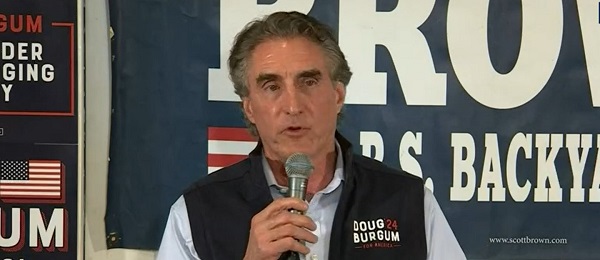Business
Trump Admin Erases Biden-Era Assault On US Energy


From the Daily Caller News Foundation
By Audrey Streb
The Trump administration officially withdrew three Biden-era policies on Monday in an effort to make it easier to develop energy resources across the National Petroleum Reserve-Alaska (NPR-A).
The Bureau of Land Management (BLM) under the Department of the Interior (DOI) withdrew three policies that supported restricting the state’s energy resource development in the NPR-A, according to the agency. Former President Joe Biden cracked down on the energy industry in Alaska, taking several actions to block mining projects as well as the oil and gas development plans in the name of nature conservation, while the Trump administration has worked to unleash the state’s vast energy resources.
“Alaska’s resource potential has been held hostage for years by anti-development ideologues,” said DOI Secretary Doug Burgum. “The Trump administration is delivering certainty for industry, opportunity for Alaskans and real energy security for the American people. We are committed to putting development back at the center of land management where it belongs.”
The Biden-era policies rescinded included one authorizing a report on “maximizing protection” in the NPR-A, as well as a request for information and a memorandum on “special areas” within the NPR-A, with Monday’s moves representing new agency priorities under the Trump administration.
The action removes “burdensome restrictions” that will allow the state to better leverage its natural resources, according to the DOI. The reversals of the Biden-era policies align with President Donald Trump’s day-one executive order on unleashing Alaskan energy.
Biden heavily restricted oil and drilling activity across almost half of the NPR-A, which spans 23 million acres on Alaska’s North Slope. Congress designated the reserve for oil and gas development in response to the oil crisis of the 1970s, and the U.S. Geological Survey estimates that there are billions of barrels of oil below the soil.
Some native communities voiced disappointment in Biden’s actions to lock up the North Slope’s energy industry at the time, subsequently cheering on Trump’s moves to unleash the state’s resource development as oil and gas is key to their economy, community leaders told the Daily Caller News Foundation previously.
Business
Largest fraud in US history? Independent Journalist visits numerous daycare centres with no children, revealing massive scam

A young journalist has uncovered perhaps the largest fraud scheme in US history.
He certainly isn’t a polished reporter with many years of experience, but 23 year old independent journalist Nick Shirley seems to be getting the job done. Shirley has released an incredible video which appears to outline fraud after fraud after fraud in what appears to be a massive taxpayer funded scheme involving up to $9 Billion Dollars.
In one day of traveling around Minneapolis-St. Paul, Shirley appears to uncover over $100 million in fraudulent operations.
🚨 Here is the full 42 minutes of my crew and I exposing Minnesota fraud, this might be my most important work yet. We uncovered over $110,000,000 in ONE day. Like it and share it around like wildfire! Its time to hold these corrupt politicians and fraudsters accountable
We ALL… pic.twitter.com/E3Penx2o7a
— Nick shirley (@nickshirleyy) December 26, 2025
Business
“Magnitude cannot be overstated”: Minnesota aid scam may reach $9 billion

Federal prosecutors say Minnesota’s exploding social-services fraud scandal may now rival nearly the entire economy of Somalia, with as much as $9 billion allegedly stolen from taxpayer-funded programs in what authorities describe as industrial-scale abuse that unfolded largely under the watch of Democrat Gov. Tim Walz. The staggering new estimate is almost nine times higher than the roughly $1 billion figure previously suspected and amounts to about half of the $18 billion in federal funds routed through Minnesota-run social-services programs since 2018, according to prosecutors. “The magnitude cannot be overstated,” First Assistant U.S. Attorney Joe Thompson said Thursday, stressing that investigators are still uncovering massive schemes. “This is not a handful of bad actors. It’s staggering, industrial-scale fraud. Every day we look under a rock and find another $50 million fraud operation.”
Authorities say the alleged theft went far beyond routine overbilling. Dozens of defendants — the vast majority tied to Minnesota’s Somali community — are accused of creating sham businesses and nonprofits that claimed to provide housing assistance, food aid, or health-care services that never existed, then billing state programs backed by federal dollars. Thompson said the opportunity became so lucrative it attracted what he called “fraud tourism,” with out-of-state operators traveling to Minnesota to cash in. Charges announced Thursday against six more people bring the total number of defendants to 92.
BREAKING: First Assistant U.S. Attorney Joe Thompson revealed that 14 state Medicaid programs have cost Minnesota $18 billion since 2018, including more than $3.5 billion in 2024 alone.
Thompson stated, "Now, I'm sure everyone is wondering how much of this $18 billion was… pic.twitter.com/hCNDBuCTYH
— FOX 9 (@FOX9) December 18, 2025
Among the newly charged are Anthony Waddell Jefferson, 37, and Lester Brown, 53, who prosecutors say traveled from Philadelphia to Minnesota after spotting what they believed was easy money in the state’s housing assistance system. The pair allegedly embedded themselves in shelters and affordable-housing networks to pose as legitimate providers, then recruited relatives and associates to fabricate client notes. Prosecutors say they submitted about $3.5 million in false claims to the state’s Housing Stability Services Program for roughly 230 supposed clients.
Other cases show how deeply the alleged fraud penetrated Minnesota’s health-care programs. Abdinajib Hassan Yussuf, 27, is accused of setting up a bogus autism therapy nonprofit that paid parents to enroll children regardless of diagnosis, then billed the state for services never delivered, netting roughly $6 million. Another defendant, Asha Farhan Hassan, 28, allegedly participated in a separate autism scheme that generated $14 million in fraudulent reimbursements, while also pocketing nearly $500,000 through the notorious Feeding Our Future food-aid scandal. “Roughly two dozen Feeding Our Future defendants were getting money from autism clinics,” Thompson said. “That’s how we learned about the autism fraud.”
The broader scandal began to unravel in 2022 when Feeding Our Future collapsed under federal investigation, but prosecutors say only in recent months has the true scope of the alleged theft come into focus. Investigators allege large sums were wired overseas or spent on luxury vehicles and other high-end purchases. The revelations have fueled political fallout in Minnesota and prompted renewed federal scrutiny of immigration-linked fraud as well as criticism of state oversight failures. Walz, who is seeking re-election in 2026 after serving as Kamala Harris’ running mate in 2024, defended his administration Thursday, saying, “We will not tolerate fraud, and we will continue to work with federal partners to ensure fraud is stopped and fraudsters are caught.” Prosecutors, however, made clear the investigation is far from finished — and warned the final tally could climb even higher.
-

 International21 hours ago
International21 hours agoOttawa is still dodging the China interference threat
-

 Business19 hours ago
Business19 hours agoThere’s No Bias at CBC News, You Say? Well, OK…
-

 Automotive18 hours ago
Automotive18 hours agoCanada’s EV gamble is starting to backfire
-

 International20 hours ago
International20 hours ago2025: The Year The Narrative Changed
-

 Fraser Institute2 days ago
Fraser Institute2 days agoCarney government sowing seeds for corruption in Ottawa
-

 Alberta2 days ago
Alberta2 days agoAlberta Next Panel calls for less Ottawa—and it could pay off
-

 Daily Caller2 days ago
Daily Caller2 days agoWhile Western Nations Cling to Energy Transition, Pragmatic Nations Produce Energy and Wealth
-

 Business1 day ago
Business1 day agoResidents in economically free states reap the rewards






